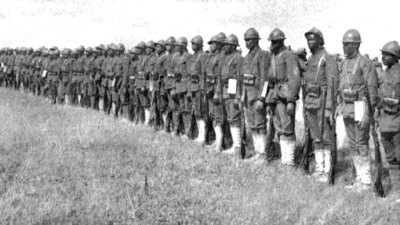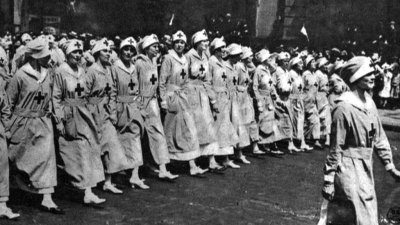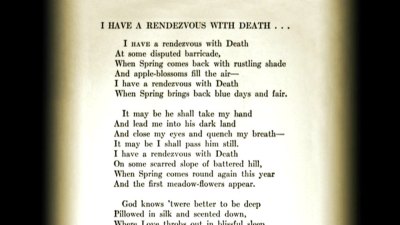| Reviews & Columns |
|
Reviews DVD TV on DVD Blu-ray 4K UHD International DVDs In Theaters Reviews by Studio Video Games Features Collector Series DVDs Easter Egg Database Interviews DVD Talk Radio Feature Articles Columns Anime Talk DVD Savant Horror DVDs The M.O.D. Squad Art House HD Talk Silent DVD
|
DVD Talk Forum |
|
|
| Resources |
|
DVD Price Search Customer Service #'s RCE Info Links |
|
Columns
|
|
|
World War 1 - American Legacy
From Inecom Entertainment comes World War 1: American Legacy, a wonderful documentary from their Minutes of History series. Utilizing spectacular black and white stills, paintings, propaganda posters, and newspaper clippings, World War 1: American Legacy bypasses a traditional chronological, straightforward history lesson on The Great War, to give the viewer a more impressionistic feel for the conflict, highlighting stories of influential people who impacted events in the War to End all Wars. Narrated by David Carradine, World War 1: American Legacy is a marvelous introduction to this increasingly forgotten conflict.

At the start of World War 1: American Legacy, the narration makes the point that World War I has steadily drifted out of our consciousness, but that its impact on the nation is still felt to this day. How we view the mechanics of war and the notions of honor and death, how we view women and minorities, as well as how we view our country and its place in the world, were all changed during and after this great conflagration. Worldwide, over 14 million people died as a result of this first "modern" war, a war that saw the invention or adaptation of many new, deadly weapons that came about due to the rapidly mechanized world: the flamethrower, the hand grenade, the machine gun, poison gas, the airplane, and the tank. In France, over 10 percent of the male population was killed off; Europe almost lost an entire generation of young men. In America, counting the numbers from the worldwide influenza outbreak that was exacerbated by the war with the combat casualties, over 120,000 soldiers died. The outcome of this war directly influenced the many political problems of the 20th century (Germany's drive to WWII, for instance), as well as problems we still deal with today (the creation of the various Middle East states).
Starting with a general overview of the war, World War 1: American Legacy spends the first 20 minutes or so of its 112 running time discussing the various world events that led up to the war, as well as the intricate web of alliances that catapulted the rest of the nations into a conflict that quickly turned into a grudge match, an excuse to slaughter each other in the name of old slights. Into this slaughterhouse finally come the Americans, and we quickly found out what Old World hate was really all about. World War 1: American Legacy doesn't get bogged down into a lot of details, dates and personalities when outlining the causes of the war; in fact, at one point, narrator Carradine states, "To make a long story short...." Hearing that, I was worried that the doc. was going to be relatively superficial, but the focus of World War 1: American Legacy is giving a more varied impression of the war, focusing on important, but perhaps forgotten or neglected, people and events from an American standpoint, rather than dry facts and figures.

Some of the highlight discussions of World War 1: American Legacy include a look at the various writers and poets that came out of this war. Alan Seeger's legacy is chronicled, discussing not only his well known poem, Rendevous, but also his love of combat and the power of war that personally drove him to take unnecessary risks in battle. Eye opening is a look at the "Harvard Volunteers," a group of America's privileged sons from Ivy League colleges who's goal was to shame America into joining the world conflict by enlisting in the French Army (can you imagine today's privileged elite doing this?). Joyce Kilmer, the poet known for the lovely Trees, is also looked at in detail, including the rather intriguing fact that he apparently became obsessed with combat, crawling out into "No Man's Land" at night on reconnaissance missions, taking risks that no one else did or would. The role of airplanes in combat is looked at, as well, with discussions of the famed, romantic Lafayette Espadrille battalion, and Victor Chapman's role in its formation. Former President Teddy Roosevelt and his sons are discussed, with the tragedy of Roosevelt's aviator son Quentin's death over the fields of Germany. The American Ambulance Field Service is also profiled, with Richard Hall - another Ivy League idealist looking for adventure - discussed. Famous fighting units are looked at, including "The Fighting 69th", the Fighting Irish Infantry Regiment, whose members included Father Duffy and William "Wild Bill" Donovan, and the "Harlem Hellfighters" of New York's 15th Regiment, an all-black volunteer group who fought racial prejudice and became the most decorated regiment in the entire war. Charles White Whittlesey of the "Lost Battalion" is also profiled, as is Cher Ami, the only carrier pigeon (that's right, a pigeon) to be awarded the Crois de Guerre by the French government. The use of horses and mules in combat are looked at, as well as the vital role that women had in the war, including nurses who saved thousands of lives, and the famed "Hello Girls" unit from the Signal Corps.
Producer and director Mark Bussler, working from a script by Brian Connelly, contributes to the relaxed, reflective tone of the piece by employing actor David Carradine (Kung Fu, Bound for Glory) to deliver the narration. At first, it took some getting used to Carradine's unique (to say the least) delivery. When first hearing him, he almost sounded a tad too "relaxed," if you know what I mean. But gradually, his laconic manner grows on you, until the final fade out, when Carradine expertly reads from Seeger's Rendevous. It's an unexpected moment, and Carradine is quite moving reading one of the greatest poems of the English language. David Carradine's vocal talents wind up adding immeasurably to the documentary's impact.

The DVD:
The Video:
Filmed in high definition, the widescreen, 1.78:1, enhanced for 16x9 TVs video image for World War 1: American Legacy is beautifully clear and sharp, with vibrant colors for the many vintage posters used, and deep blacks for the archival stills employed.
The Audio:
The strong soundtrack is available in both Dolby Digital 5.1 Surround Sound and 5.1 DTS Digital Surround.
The Extras:
There are trailers included for other Inecom Minutes of History documentaries, including: Blood and Oil - The Middle East in World War I; Lincoln and Lee at Antietam - The Cost of Freedom; EXPO - Magic of the White City; Gettysburg and Stories of Valor; Horses of Gettysburg; Winters of War; Shot to Pieces; and Johnstown Flood.
Final Thoughts:
I learned a lot of new information from World War 1: American Legacy, while being entertained by the excellent use of photo stills, painting and posters in detailing The Great War. As well, the moving narration by David Carradine is real treat. I recommend World War 1: American Legacy to anyone who wants to learn more about WWI.
Paul Mavis is an internationally published film and television historian, a member of the Online Film Critics Society, and the author of The Espionage Filmography.


|
| Popular Reviews |
| Sponsored Links |
|
|
| Sponsored Links |
|
|
| Release List | Reviews | Shop | Newsletter | Forum | DVD Giveaways | Blu-Ray | Advertise |
|
Copyright 2024 DVDTalk.com All Rights Reserved. Legal Info, Privacy Policy, Terms of Use,
Manage Preferences,
Your Privacy Choices | |||||||














